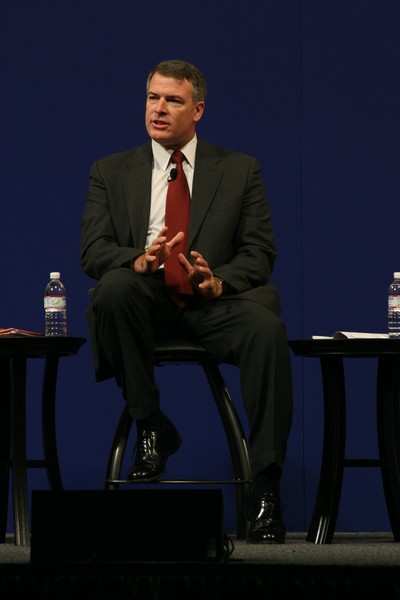'What Part Of NO Don't They Understand?'
On Monday, the Bush Administration released its proposed budget
for fiscal year 2009... and it represents more of the same for
general aviation, as the White House continues to push for deep
cuts in programs vital to smaller airports, while continuing to
show an apparent prejudice towards airlines.

In announcing the Department of Transportation's $68 billion cut
of the budget plan, DOT Secretary Mary Peters touted the
administration's $10.1 billion pledge for transit programs...
including $688 million for the transition to the agency's
much-touted -- but so far, under-realized -- NextGen air traffic
control system.
"If last-year’s record traffic jams and flight delays
taught us anything, it is that traditional approaches are not
capable of producing the results we need to keep America’s
economy growing," Peters said.
 Of course, that extra
money has to come from somewhere... especially as the lame-duck
administration looks to cut spending for the year. To the
consternation of almost everyone -- except the airlines -- the plan
also calls for the FAA to be funded through a mix of new taxes and
user fees imposed on general aviation.
Of course, that extra
money has to come from somewhere... especially as the lame-duck
administration looks to cut spending for the year. To the
consternation of almost everyone -- except the airlines -- the plan
also calls for the FAA to be funded through a mix of new taxes and
user fees imposed on general aviation.
"What part of 'NO!' doesn’t the White House understand?"
said Phil Boyer, president of the Aircraft Owners and Pilots
Association (AOPA), after reviewing the White House plan. "They
just changed the dates and submitted essentially the same proposal
as last year -- a proposal soundly rejected by the general aviation
community, the House, and the Senate...
"[D]id they really think that this year we would roll over for a
70-cents-per-gallon tax on avgas, and universal user fees to access
portions of the National Airspace System?" Boyer asked. "Congress
rejected that tax increase and broad user fees last year, and
Congress has shot down user fee proposals for the last three
decades. AOPA will continue to fight any attempt to impose user
fees on any segment of aviation."
Pete Bunce, president and CEO of the General Aviation
Manufacturers Association (GAMA), also termed the budget proposal
more of the same. "Despite Congress saying "no" to the
Administration's proposal to scrap the current funding mechanism
for a less efficient one that imposes user fees, they have once
again launched an effort to complete a FAA reauthorization bill by
proposing the exact same failed plan," said Bunce (shown below.)
"GAMA continues to categorically oppose user fees of all types on
any segment of the aviation community. We will continue our efforts
with Congress to complete action this year on a FAA reauthorization
bill, but quite frankly, the Administration pushing a financing
scheme the Congress has already rejected makes our job
tougher."
It gets worse. Under the president's budget plan, the FAA's
Airport Improvement Program would be cut by $765 million over 2008
-- and about $1 billion less than what Congress has already
approved. The AIP funds improvements for large and small airports
alike... but typically makes up a far larger percentage of the
annual budgets of smaller GA fields.

"Once again, the Bush administration wants huge new taxes and
user fees imposed on general aviation, and it wants to slash and
burn the Airport Improvement Program (AIP)," said Boyer. "To think
that GA or Congress is going to treat this proposal any differently
than the last one is, frankly, crazy, and a waste of government
resources in ideological posturing... We're facing a capacity
crisis at the major airline airports, and even the FAA concedes
that the most effective method of decreasing congestion is building
new runways. Yet they cut money for construction."
Bunce added, "It is pretty hard to believe the Administration is
serious about increasing capacity when they again cut Airport
Improvement Program (AIP) funding by nearly 22 percent."
The proposed cut to AIP funding angered Airports Council
International – North America (ACI-NA)... which also
questioned the logic of steps to increase traffic capacity, while
cutting funding for much-needed improvements to the nation's
airport infrastructure.
 "Without increased
funding, airports cannot fulfill their obligation to the flying
public: to operate safe, secure and efficient facilities," said
ACI-NA President Greg Principato. "With delays and congestion at an
all-time high, and a record one billion passengers expected in the
skies by 2015, airports need to act now to improve capacity and
their ability to handle ever-increasing numbers of air travelers.
The Administration’s budget proposal will not allow for the
kind of expansion that is vital to our aviation system."
"Without increased
funding, airports cannot fulfill their obligation to the flying
public: to operate safe, secure and efficient facilities," said
ACI-NA President Greg Principato. "With delays and congestion at an
all-time high, and a record one billion passengers expected in the
skies by 2015, airports need to act now to improve capacity and
their ability to handle ever-increasing numbers of air travelers.
The Administration’s budget proposal will not allow for the
kind of expansion that is vital to our aviation system."
Principato also noted the Administration’s FY09 budget
also would eliminate funding for the Small Community Air Service
Program, as well as significantly reduce the Essential Air Service
Program (EAS). "These programs are critical for small communities
throughout this country," he said.
That sentiment was also echoed by Boyer. "We’re facing a
capacity crisis at the major airline airports, and even the FAA
concedes that the most effective method of decreasing congestion is
building new runways. Yet they cut money for construction," Boyer
said.
"The facts bear repeating. The current funding system of
aviation excise taxes works," Boyer concluded. "These proven taxes
will generate all the necessary funds for air traffic control
modernization and for new runways. Let’s bring some sanity
back to the budget process and go with what we know works, and what
the general aviation public and Congress will support."
Sanity? In federal government?
 NTSB Final Report: Cozy Cub
NTSB Final Report: Cozy Cub ANN FAQ: Contributing To Aero-TV
ANN FAQ: Contributing To Aero-TV Classic Aero-TV: Seated On The Edge Of Forever -- A PPC's Bird's Eye View
Classic Aero-TV: Seated On The Edge Of Forever -- A PPC's Bird's Eye View ANN's Daily Aero-Linx (04.29.25)
ANN's Daily Aero-Linx (04.29.25) ANN's Daily Aero-Term (04.29.25): Execute Missed Approach
ANN's Daily Aero-Term (04.29.25): Execute Missed Approach






